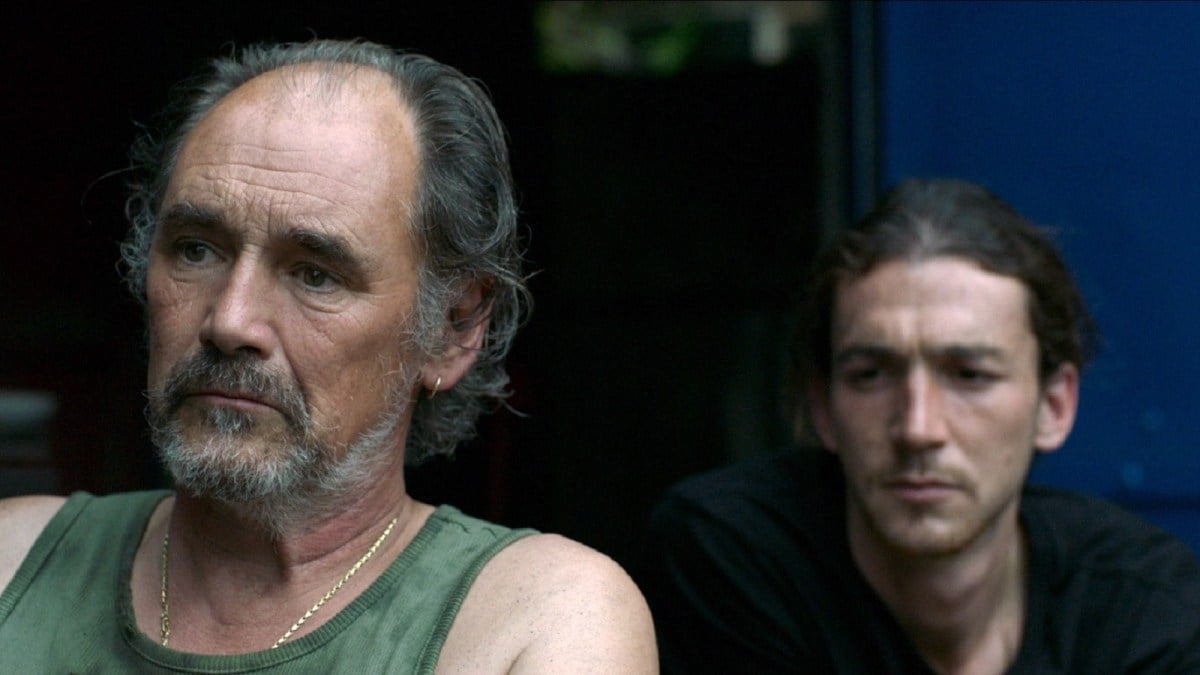Urban legends, fireside fables and faery folk cavorting in forests may not sound like a starting point for family drama, but writer-director Fridtjof Ryder begs to differ with Inland, crafting, as he does, an eerie, if disjointed, tale of disconnection, disappearance, and rebirth in this festival film.
Grounded by an intriguing performance from Rory Alexander, Inland has all the hallmarks of a slow-burn character study, with supernatural elements front and center. Flashbacks to childhood encounters with woodland statues open a film that is more sensory than cinematic. An approach that consistently tests attention spans, as scenes are drawn out by static shots and ponderous moments of introspective.
Having been released from a rehab center for an unknown condition, the man (Rory Alexander) makes his way home to see Dunleavy (Mark Rylance), a garage owner who lives alone in the woods with only his dog for company. Their reunion is awkward and conversations stilted, as both men quietly dwell on the things which remain unsaid. For that reason, Inland really struggles with momentum from the outset as this story attempts to find its feet.
Digressions into arthouse territory only manage to make things more challenging, as the man starts working at Dunleavy’s garage to earn some money. That in turn leads to an invitation for drinks with his fellow mechanics down at an eerie-looking brothel. As writer-director Fridtjof Ryder manipulates expectations through some abstract set design choices, Inland continues to have pacing issues.
As much as the psychological disconnections between the man and Dunleavy are tangible, both Mark Rylance and Rory Alexander feel wasted. There is simply not enough drama happening on screen, while the repetition of a husky voiceover reciting nursery rhymes feels superfluous. If anything, an expansion of that particular element in this drama would have made Inland more interesting as the notion of Romany faery folk is only ever implied.
Lots of lingering shots of woodland and flashbacks to a moonlit vigil are not the stuff of substance. From the opening frame, where the stark realities of rehab clash with a character still dealing with abandonment issues, Inland never really feels cohesive. As the psychological traumas of this man begin to manifest themselves through odd visions and endless nighttime road trips, Inland drifts increasingly into the realm of arthouse hybrid.
Superfluous sub-plots which try to justify his emotional instability rarely ring true, while violent confrontations only serve to undermine any moments of gentle introspection. As a right, tonally, Inland feels conflicted in terms of genre, which translates to indifference and a lack of emotional investment overall. It’s a fact that is compounded into disappointment, as these characters feel hampered by creative choices which impact the movie experience.
Nowhere is that more keenly felt than with Rylance, who on this occasion, simply lacks anything tangible to work with. Although the character of Dunleavy clearly has depth, almost everything else around him feels thin and undeveloped. Even Alexander, who is straining every sinew to breathe life into the man, struggles to find coherence in his performance. One of many reasons why some people might bail early on this sub-standard family drama.
In terms of redeeming features that might recommend Inland to an audience, only the sound design seems worth mentioning. Headed by sound effects editor Markus Andreas, who has Christopher Nolan’s Tenet amongst his career accomplishments, Inland maintains an eerie ambiance throughout, which at least imbues the film with a sense of creeping dread, not only diverting attention away from the disjointed structure but providing the film with a modicum of psychological substance.
Beyond that Inland feels more like an exercise in style over substance, where visual experimentations hamper any attempts at storytelling. That being said, although this film might not come together, there was clearly something that attracted Mark Rylance to the role. However, that got lost in translation from script to screen not only resulting in an unengaging cinematic experience but a valuable lesson for all involved —a lesson that demonstrates how even revered actors can make mistakes when it comes to creative choices.
If anything, Inland demonstrates what can happen when arthouse pretensions get in the way of a good story.
Middling
Mark Rylance is wasted in this ponderous piece of arthouse introspection
LFF Review: 'Inland' is marred by arthouse introspection and a ponderous plotline

